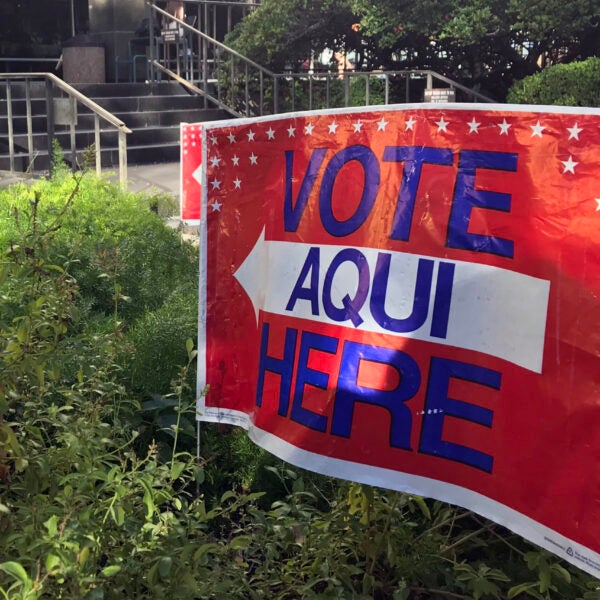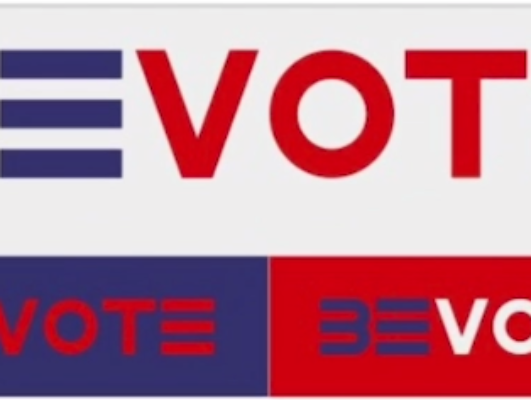[[Update: Voting is Today!]]
Election Day is tomorrow, Tuesday, Nov. 6, and one question everyone is asking is: Will young people turn out to the polls?
Texas currently ranks dead last in voter participation. Only 28 percent of eligible voters cast a ballot in 2014. In 2018, however, this is shifting – largely due to young voters. In Texas, turnout of voters ages 18-29 is up a whopping 508 percent.
The momentum is great, but for many first-time voters, the voting process can be confusing. At The University of Texas at Austin, a team of faculty members and students has designed an app to help.
BeVote, playfully named after the beloved university mascot Bevo, is a one-stop shop for everything anyone needs to know before voting. The nonpartisan app is designed to target students by addressing questions new voters may have.
BeVote helps you check registration status, research candidates, maintain a voting checklist, create a personalized ballot ahead of time, and (possibly one of the coolest features) see a map of polling locations with wait times.

The app also sends users notifications about important dates during the election cycle, and it allows voters to easily share that they voted on their Twitter, Facebook and Instagram accounts.
The goal: to remove any excuse for not casting a ballot.
Increasing student voter turnout isn’t just a numbers game. It is about establishing a culture of voting in the United States. To increase democratic participation, voting needs to start early and become a lifelong activity.
“Research suggests that voting is habit-forming,” says Susan Nold, director of the Annette Strauss Institute for Civic Life and a member of the BeVote team. “Once people start voting, they are likely to continue to vote in future elections. Our government depends on citizens taking part by casting informed votes in elections.”
BeVote started about a year ago when Paul Toprac, associate director for game design and development in the Department of Computer Science, sent an email to professors across campus asking whether they had any great app ideas his group could help develop.
When English professor Hannah Wojciehowski opened the email, she was excited. She had been thinking for a while about how great it would be if there was a cell phone app that could make voting easier by gathering everything you need to know in one convenient location.
“She pitched the idea for the app, and I thought ‘darn good idea.’ We have been working hard to make it happen ever since,” says Toprac.
They quickly contacted Nold and doctoral candidate Kassie Barroquillo, who are experts on student voting patterns, to help advise on the project.
All the professors agreed it was crucial for students to play a big role in bringing BeVote to life. School of Information graduate student Mona Mishra and Kathy Vong from the College of Fine Arts designed the app. Robert McInvale, a computer science and mathematics senior, built the iOS version, released Oct. 18.
“This app is designed and developed by UT students for UT students,” says Toprac.
This app is designed and developed by UT students for UT students.
Morgan Lawless, a senior in computer science and Plan II, developed the Android version of BeVote.
“I took a mobile computing class last semester, and I wanted to create a voting utility like BeVote, but decided I didn’t have enough time. By sheer coincidence, Dr. Wojciehowski, whose World Literature class I had taken my freshman year, reached out to me a couple weeks later to ask if I wanted to be a developer for this project,” he says. “It was a stroke of serendipity.”
Lawless says there are unique challenges to voting as a student that people might not consider. For example, Lawless is an out-of-state student, but he is registered to vote in Texas.
“When I tried to vote in my first election while at UT, I went to the polls and was turned away because a New York state driver’s license isn’t considered valid. I had to go back to my dorm, grab my passport, and come back. I imagine a lot of students wouldn’t have had the time to go back or would have understandably felt frustrated in that situation, and so they wouldn’t have voted. I hope that BeVote can help solve this problem,” says Lawless.
Although the app is geared toward UT students, anyone can use it to prepare a ballot or find a shorter voting line around town.
“BeVote is an invitation to join in the democratic process, and it’s a wake-up call that says, “Hey, you matter! Your views matter. Your vote matters,” says Wojciehowski.
BeVote is an invitation to join in the democratic process, and it’s a wake-up call that says, “Hey, you matter! Your views matter. Your vote matters."
The BeVote App is sponsored by the Annette Strauss Institute for Civic Life, Cockrell School of Engineering, College of Liberal Arts, Division of Diversity and Community Engagement, Moody College of Communications, Office of the Vice-President for Student Affairs, SAGA Lab, TX Votes, University of Texas Libraries, and University of Texas Student Government.

